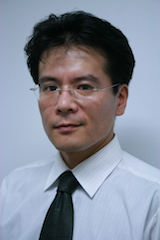|
Position |
Professor |
|
Research Field |
Life Science / Pharmaceutical analytical chemistry and physicochemistry, Life Science / Molecular biology, Nanotechnology/Materials / Chemistry and chemical methodology of biomolecules, Nanotechnology/Materials / Bio chemistry, Life Science / Structural biochemistry |
|
External Link |
|
|
|
Graduating School 【 display / non-display 】
-
Graduate School of Hokkaido University Pharmaceutical Sciences Graduated
1991.4 - 1994.3
Graduate School 【 display / non-display 】
-
Hokkaido University Graduate School, Division of Pharmaceutical Sciences Doctor's Course Completed
1991.4 - 1994.3
-
Osaka University Graduate School, Division of Pharmaceutical Sciences Master's Course Completed
1989.4 - 1991.3
Studying abroad experiences 【 display / non-display 】
-
2001.3-2002.3
Yale University Visiting Scholar
Campus Career 【 display / non-display 】
-
KONAN UNIVERSITY Konan Laboratory for Oligonucleotide Therapeutics (KOLOT) Director in General
2022.4 - 2026.3
-
KONAN UNIVERSITY Faculty of Frontiers of Innovative Research in Science and Technology Faculty of Frontiers of Innovative Research in Science and Technology Department of Nanobiochemistry Department of Nanobiochemistry, FIRST Professor
2009.4
-
理工学部 機能分子化学科 准教授
2007.4 - 2009.3
-
理工学部 機能分子化学科 助教授
2005.4 - 2007.3
-
理工学部 機能分子化学科 講師
2001.4 - 2005.3
External Career 【 display / non-display 】
-
国立医薬品食品衛生研究所
2025.12
-
The University of Osaka Graduate School of Pharmaceutical Sciences
2021.6
-
YALE University Department of Molecular, Cellular and Developmental Biology
2001.4 - 2002.3
-
住友化学工業株式会社 生命工学研究所
1994.4 - 1996.3
Country:Japan
Professional Memberships 【 display / non-display 】
-
Nucleic Acids Therapeutics Society of Japan
2015.4
-
The Japan Society of Nucleic Acids Chemistry
2017.11
-
American Association for the Advancement of Science
1996.4
-
The RNA Society
2007.4
Papers 【 display / non-display 】
-
Theoretical calculation of the amounts of nucleotide deletion impurities in oligonucleotides Reviewed
Yasunori Uchida, Tokuyuki Yoshida, Emi Saito, Hirokazu Nankai, Kaoru Karasawa, Chie Inagaki, Noriyuki Iwasaki, Daisuke Higo, Kentaro Takahara, Takashi Osawa, Takao Yamaguchi, Kosuke Ito, Junji Kawakami, Satoshi Obika, Takao Inoue
International Journal of Pharmaceutical 2025.11
-
Current Trends in Liquid Chromatography-Mass Spectrometry Analysis of Small Interfering RNAs: A Short Review Reviewed
Hiroyuki Togawa, Takao Yamaguchi, Junji Kawakami, Satoshi Obika
Journal of Chromatography A 2025.11
-
Effects of acid-mediated deamination of cytidine and 5-methylcytidine on solid-phase synthesis of oligonucleotides Reviewed
Yusuke Isono, Chihiro Karasugi, Takuya Akisawa, Takashi Osawa, Qin Ren, Michiaki Tatsuno, Fumi Ito, Takao Inoue, Junji Kawakami, Satoshi Obika, Masaki Shinoda
Tetrahedron 185 134840 - 134840 2025.10
-
Functional analysis of histidine-dependent self-cleaving RNAs obtained by in vitro selection Reviewed
Nae Sakimoto, Shoichiro Tanaka, Riki Hatakenaka, Yoshie Yamaguchi-Miyazaki, Elisa Tomita-Sudo, Tomoka Akita, Taku Ishigaki, Shigenori Iwai, Junji Kawakami
ChemBioChem e202500411 2025.9
-
Bioinformatic Analysis of Actin-Binding Proteins in the Nucleolus During Heat Shock Reviewed
Shinya Taniguchi, Takeru Torii, Yoshiyuki Goto, Kohei Takeuchi, Rine Katsumi, Mako Sumida, Sunmin Lee, Wataru Sugimoto, Masaya Gessho, Katsuhiko Itoh, Hiroaki Hirata, Junji Kawakami, Daisuke Miyoshi, Keiko Kawauchi
Genes 15 1580 2024.12
Books and Other Publications 【 display / non-display 】
-
核酸医薬 モダリティ・合成・分析・DDSの最新動向
冨田恵麗沙, 秋田智香, 川上純司( Role: Contributor , 核酸医薬の不純物と管理)
NTS 2024.4 ( ISBN:9784860438869 )
-
不純物の分析法と化学物質の取り扱い
騰川博之, 大久保貴史, 野中祐美, 山口卓男, 小比賀聡, 川上純司( Role: Contributor , 核酸医薬品の不純物の分析)
技術情報協会 2024.1 ( ISBN:9784861049989 )
-
核酸医薬品のCMC管理戦略 −品質評価・不純物管理−
冨田恵麗沙, 秋田智香, 川上純司( Role: Contributor , 核酸医薬品と核酸化学)
サイエンス&テクノロジー 2022.9 ( ISBN:9784864282925 )
-
実験医学 (Experimental Medicine)
秋田智香, 川上純司( Role: Contributor , 核酸医薬の化学 総論-修飾核酸と機能評価)
羊土社 2021.11 ( ISBN:9784758103985 )
-
核酸科学ハンドブック
川上純司( Role: Contributor , アンチセンス核酸のメカニズム)
講談社 2020.12 ( ISBN:9784065207864 )
Review Papers (Misc) 【 display / non-display 】
-
UV融解曲線を用いた核酸二本鎖形成に関する速度論的パラメータの簡易的な解析方法 Invited
冨田恵麗沙, 川上純司
JASCO REPORT 66 ( 2 ) 39 - 44 2025.9
Authorship:Last author, Corresponding author Publishing type:Article, review, commentary, editorial, etc. (scientific journal)
-
LC/MSを使用したオリゴ核酸の不純物分析 Invited
Medical Science Digest 49 ( 14 ) 780 - 782 2023.12
Publishing type:Article, review, commentary, editorial, etc. (scientific journal)
-
核酸医療の基礎知識 修飾核酸 Invited
秋田 智香, 冨田 恵麗沙, 川上 純司
CLINICAL NEUROSCIENCE 41 ( 5 ) 639 - 642 2023.5
Authorship:Last author, Corresponding author Publishing type:Article, review, commentary, editorial, etc. (scientific journal)
-
日本発の核酸医薬を世界に向けて Invited
SCAS NEWS 23-Jan 1 - 2 2023.1
Authorship:Lead author, Last author, Corresponding author Publishing type:Article, review, commentary, editorial, etc. (trade magazine, newspaper, online media)
-
LC/MSを使用したオリゴ核酸の不純物分析
瀬崎浩史、内藤厚子、林明生、川上純司、井上貴雄、山口卓男、小比賀聡
Medical Science Digest 49 ( 14 ) 780 - 782 2023
Presentations 【 display / non-display 】
-
DNA検出アプタマーセンサーにおける標的結合部位の検討
松阪依美里, 嵜本捺愛, 岩井成憲, 川上純司
第48回日本分子生物学会年会 2025.12
Event date: 2025.12
-
Regnase-1ステムループ構造を標的とするASOとmRNAモデルとの結合特性とネガティブフィードバック阻害効果との関係
枇杷田輝, 西川奏, 長谷井くるみ, 嵜本捺愛, 川上純司
第48回日本分子生物学会年会 2025.12
Event date: 2025.12
-
高親和性LNAを導入したDNAzymeにおけるmismatch識別能
土居奈月, 枇杷田輝, 嵜本捺愛, 岩井成憲, 川上純司
第48回日本分子生物学会年会 2025.12
Event date: 2025.12
-
Effect of conjugates on binding energy of DNA/RNA duplex formation
Renshin Sano, Nae Sakimoto, Elisa Tomita-Sudo, Tomoka Akita, Kaito Sato, Yoshihiro Okada, Junji Kawakami
The 52nd International Symposium on Nucleic Acid Chemistry 2025.11
Event date: 2025.11
Grant-in-Aid for Scientific Research 【 display / non-display 】
-
ヘアピンループDNA/RNAを認識するモデルペプチドの速度論的機能評価
2004.4 - 2006.3
JSPS Grants-in-Aid for Scientific Research Grant-in-Aid for Young Scientists(B)
ヘアピンループDNA/RNAを認識するモデルペプチドの速度論的機能評価
領域・整理
・課題番号
4706
7305
16750150 -
ヘアピンループDNA/RNAを認識するモデルペプチドの速度論的機能評価
2004.4 - 2006.3
JSPS Grants-in-Aid for Scientific Research Grant-in-Aid for Young Scientists(B)
ヘアピンループDNA/RNAを認識するモデルペプチドの速度論的機能評価
領域・整理
・課題番号
4706
7305
16750150 -
ヘアピンループDNA/RNAを認識するモデルペプチドの速度論的機能評価
2004.4 - 2006.3
JSPS Grants-in-Aid for Scientific Research Grant-in-Aid for Young Scientists(B)
ヘアピンループDNA/RNAを認識するモデルペプチドの速度論的機能評価
領域・整理
・課題番号
4706
7305
16750150
Other External funds procured 【 display / non-display 】
-
核酸医薬品の製造・精製・分析基盤技術の開発-2
2021.9 - 2026.3
国立研究開発法人 日本医療研究開発機構(AMED) 次世代治療・診断実現のための創薬基盤技術開発事業(RNA標的創薬技術開発)
川上純司
Authorship:principal_investigator
-
mRNAを用いた医療モダリティの品質評価及び管理に関する研究
2024.4 - 2027.3
国立研究開発法人 日本医療研究開発機構(AMED) 医薬品等規制調和・評価研究事業
井上貴雄, 山本武範, 吉田徳幸, 小比賀聡, 川上純司
Authorship:coinvestigator
Preferred joint research theme 【 display / non-display 】
-
リアルタイムPCR等を使用した遺伝子の定量解析
-
新規機能性核酸(アプタマー等)の取得
-
人為的遺伝子発現調節(翻訳)
Committee Memberships 【 display / non-display 】
-
2010.12 アンチセンスDNA/RNA研究会 第20回アンチセンスシンポジウム オーガナイザー
Social Activities 【 display / non-display 】
-
模擬講義
2014.12
毒学/兵庫大学附属須磨ノ浦高等学校
-
出張模擬講義
2014.12
毒学 - 薬学へのいざない/兵庫県立舞子高等学校
-
サイエンスパートナーシッププロジェクト
2014.8
自然科学入門講座「身近な生活から最先端の遺伝子研究について学ぶ」- 遺伝子鑑定/兵庫県立星陵高等学校
-
etc
2014.3
遺伝子鑑定の精度・信憑性/兵庫県警察本部 刑事部
-
模擬講義
2013.12
くすりの科学/須磨ノ浦女子高等学校




